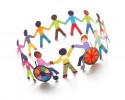Lending a Helping Hand: Learning Disabilities

A learning disability is a general term used to identify a variety of learning problems. Many students are affected by learning disabilities, and this can have a great impact on their educational experiences.
Having a learning disability does not at all mean that a student is unintelligent or lazy. Instead, it is likely that the student just perceives things differently, or the way that they learn and acquire information is different from others. There is nothing wrong with this—it is to do with a difference in brain activity and it is not a question of some students being “worth” more than others.
There are many different types of learning disabilities that can affect any part of the educational process. For example, a common condition, dyslexia, causes difficulties for students when reading. Dyslexic students may have difficulty with clearly distinguishing between letters or words, understanding ideas in written passages, or gathering a complex vocabulary.
Similarly, dyscalculia is a learning disability that has to do with numbers, sequences, and mathematical concepts. Students with dyscalculia may have trouble with memorizing number sequences, distinguishing between operations, or organizing calculations in a logical way. Other conditions that could cause difficulties for students include ADD/ADHD and visual or auditory impairments.
These are just two examples of learning disabilities—in fact, there are many more conditions that can affect a student’s learning process. Knowing this, it is important to provide students with learning disabilities with resources and support so that they can reach their full potential when learning. It is crucial that all students have the opportunity to learn at their own pace, on their own terms, and in a way that suits their individual needs. In this way, no student is left behind.
There are resources available to students with learning disabilities within the educational network. Guidance counselors, social workers, and youth psychologists are professionals to contact in order to determine the solution that works best for the student in question. An open line of communication between the teacher and the family is also crucial: it is important that the teacher knows about the student’s learning disability and takes steps to be inclusive and engaging.
There are also many organizations and online resources that are dedicated to helping individuals with learning disabilities. The Learning Disabilities Association of Canada (http://www.ldac-acta.ca/) has excellent information on their website, and they provide a variety of services across Canada, in person (with offices in 10 provinces and 1 territory), as well as online. Furthermore, LD OnLine (http://www.ldonline.org/index.php), as the leading website on learning disabilities, disorders, and differences, provides extensive information and resources for all types of conditions that could affect a student’s educational progress.
Finally, as an individual, it is important to be compassionate, understanding, and accommodating towards these students. Whether or not you are affected by a disability yourself, you must recognize the importance of treating others with respect, and ensuring that everyone has a fair opportunity to succeed, and feels part of the community.
Sources:
http://www.helpguide.org/articles/learning-disabilities/learning-disabilities-and-disorders.htm





Leave a comment!